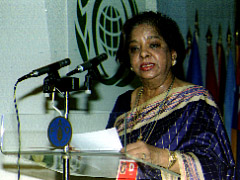


UNITED NATIONS POPULATION FUND (UNFPA) - FONDS DES NATIONS UNIES POUR LA POPULATION - FONDO DE POBLACION DE LAS NACIONES UNIDAS | ||
Ms. Nafis Sadik, Executive Director, United Nations Population Fund (UNFPA) | ||

In the complex discussion on food security, we should keep in mind two simple facts: First, population growth will be the biggest single factor in determining food needs in the next 20 years. Second, much of this food will be provided, grown, marketed, prepared and put on the table, by women. Ensuring equity and equality for women will provide one of the keys to food security. Empowering women will make a further crucial contribution to development: it will help the poorest escape from poverty, and it will help to slow and eventually stabilize world population growth. World population growth is now close to 5.9 billion and is rising by 86 million people every year. By the middle of the next century the world population could be as low as 8 billion or as high as 12 billion a difference equal to the whole of the world population in 1975. Action on population policy in the next decade will determine our demographic future, and with it future food security. In most countries with high rates of population growth, women would like to have fewer children than their parents' generation. If women could choose, families would be smaller and population growth slower. The most obvious step is to equip women with the information and the means to time pregnancy as and when they wish. Ensuring the ability of women and men to exercise their reproductive rights will have a decisive impact on population growth and on prospects for food security in the twenty-first century. Among their many other roles, women provide much of the food grown for home consumption in the developing world. Such women need equal access to education and training, agricultural extension services, technology and credit. They need security of land tenure and equal rights to inheritance. All over the world, and especially among the poor, women's inequality affects their nutritional and health status. For many women, dietary deficiency starts in childhood and affects the whole course of their lives. At the individual level, food security means equal access to food for all members of the family. Women contribute equally: they have the right to equal treatment. I am stating nothing new, these rights are recognized by the whole international community. We must now work to make them a reality. Let me add, with special reference to the crisis now unfolding in Zaire, that refugees, internally displaced persons and persons in all emergency situations have the same vital human rights, including the right to reproductive health, as people in any community. I am glad to say that UNFPA will today sign an agreement with the Federation of Red Cross and Red Crescent Societies, in cooperation with the UNHCR and NGOs, which will bring reproductive health care to refugees in the Great Lakes region of Africa, and will offer similar assistance in all future refugee situations. As countries struggle to feed increasing numbers of people, planners and policy-makers must acknowledge both women's vital role as food producers and their contribution to the health and nutritional status of their families and communities. Support for women in both productive and reproductive roles will improve reproductive health and food security in the family and the community. Now and in the future, empowering women will help to feed the world. I am happy that the document before you refers to the need for early population stabilization. UNFPA is committed to implement the Rome Declaration and the Plan of Action. As enunciated in the International Conference on Population and Development, population stabilization can only be achieved by ensuring that reproductive rights, health and human development are priorities in national, regional and international development programmes. Freedom of choice for women and men in the size and spacing of their families - and access to the information and the means to make that choice - remain the guiding principle. It should be the practice, in all countries of the world and for all the people of the world. | ||
|
|
|
|

 |